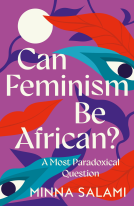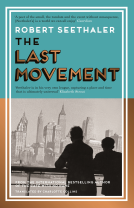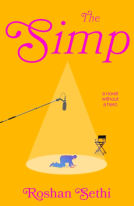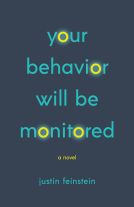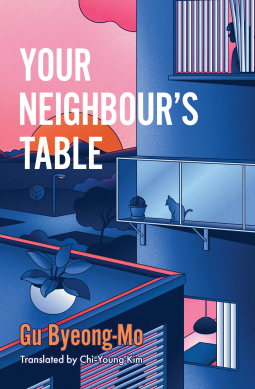
Your Neighbour's Table
An incisive and timely Korean bestseller about marriage, community and motherhood
by Gu Byeong-mo
This title was previously available on NetGalley and is now archived.
Send NetGalley books directly to your Kindle or Kindle app
1
To read on a Kindle or Kindle app, please add kindle@netgalley.com as an approved email address to receive files in your Amazon account. Click here for step-by-step instructions.
2
Also find your Kindle email address within your Amazon account, and enter it here.
Pub Date 3 Dec 2024 | Archive Date 17 Dec 2024
Headline | Wildfire
Talking about this book? Use #YourNeighboursTable #NetGalley. More hashtag tips!
Description
'An important literary piece of feminist activism'
'Taps into the everyday minutiae of motherhood, baring to all the unspoken labours that women take on both inside and out of parenthood'
'Really made me reflect on what it actually means to be a part of a community'
'Given recent news stories this feels like an incredibly relevant read'
-------------------------------------
From the award-winning Korean author Gu Byeong-mo and International Booker-nominated translator Chi-Young Kim, comes a thought-provoking story of community and the cultural expectations of motherhood.
What are you willing to sacrifice for a 'better' life?
When Yojin moves with her husband and daughter into the Dream Future Pilot Communal Apartments, she's ready for a fresh start. Located on the outskirts of Seoul, the experimental community is a government initiative designed to boost the national birth rate. Like her neighbours, Yojin has agreed to have at least two more children over the next ten years.
Yet, from the day she arrives, Yojin feels uneasy about the community spirit thrust upon her. Her concerns grow as communal child care begins and the other parents show their true colours. Your Neighbour's Table traces the lives of four women in the apartments, all with different aspirations and beliefs.
Will they find a way to live peacefully? Or are society's expectations stacked against them from the start?
A trenchant social novel from an award-winning author, Your Neighbour's Table incisively illuminates the unspoken imbalance of women's parenting labour and the challenges of working towards a better life.
** Translated from the Korean by Chi-young Kim **
[Published in North America with the title APARTMENT WOMEN]
Advance Praise
"Reading this incisive, delicate and wholly original book, I found that words like 'family', 'neighbor', 'nature', and 'community' no longer evoked warm and bountiful images in me. They gave me a chill. And I know that this is reality." Cho Nam-Joo, author of KIM JI YOUNG BORN IN 1982
"Gu Byeong-mo's Your Neighbour's Table is a sharp examination of the boundary between the utopic ideals of community and the dystopian realities of late capitalism. The characters - beautifully drawn, full of flaws and wholly human - live side-by-side in a tense intimacy that haunted me long after I put the book down." Sarah Ruiz-Grossman, author of A Fire So Wild
"Under the smooth surface of the table, the readers may perceive the dissonance between the ones who wants to have close and friendly relationship with their neighbours, sharing their daily lives, and the ones who can't afford it. There are conflicts over delicate issues regarding their community and crossing of the line. The author relentlessly reveals the dark side of the word 'warm community' that we have so far been using without questioning." Korea Herald
Available Editions
| EDITION | Other Format |
| ISBN | 9781035416479 |
| PRICE | £14.99 (GBP) |
| PAGES | 224 |
Available on NetGalley
Average rating from 55 members
Featured Reviews
I’m a childfree, introverted, and not super social person that needs quiet, so the idea of communal apartment living where occupants are forced to agree to have a quota of children is pretty much my idea of hell.
This claustrophobic and all-too-human story cuts right to the quick with expert commentary on capitalism, women’s identities, cultural expectations, motherhood and parenting, and more. The writing style is phenomenal, with some incredible quotes, and sucked me right into the world of this small, claustrophobic apartment and the raw, real people that circumstance who find themselves in this bizarre living arrangement.
My reflections while reading this book:
• The communal living arrangement was stifling and it would be utterly exhausting having to worry about what others think and filter everything you do and say. The clause about being forced to have three children or pay back the rent (or, show invasive and upsetting proof that you’d be unable to conceive) absolutely infuriated me! The book provides such a beautiful challenge about what ‘community’ is and how easily things can turn septic for folks who live in close proximity and don’t have boundaries (or are constantly having their boundaries violated).
• Reading this feels slightly voyeuristic. It’s like a big pileup on the highway, horrifying yet one struggles to look away.
• While excruciating to read, the commentary on capitalism and job culture didn’t hold back: it was honest, raw, timely, and was a strong theme throughout the story.
• Our story also features important commentary on culture and how expectations shape women’s ideas of themselves and each other, the internalized (and overt!) misogyny was heartbreaking and infuriating to read. I especially wanted to give Hyonae and Yojin a warm blanket, a hot drink, and a big hug!
• The men are horrible: entitled, rude, dismissive, clueless, and helpless.
• My heart broke for little Siyul and the caregiving roles that she was forced into as the eldest girl. Let her be a kid, the lass is six!
• For a very brief period, I participated in an online selling community. The bit about Gyowon using her kids as leverage to lowball and manipulate sellers was such a common complaint but I don’t really understand why she was dragged online for it. After all, you don’t ask, you don’t get! Plus, in the example provided, Gyowon was polite and respected the seller’s boundaries. In the UK, the seller would be more likely to be threatened and abused for having the temerity to refuse a lowball offer from an entitled parent.
• While this book might not be a horror in the typical sense of the genre, I felt such a creeping unease while reading it!
• The ending is just *chef’s kiss*
I honestly think that, no matter what your personal, financial, and life circumstances are, most people would take something away from this book. It’s a relatively short read at 220 pages and has many good reflection points on a variety of themes… stuff we really need to examine about ourselves, and the world we build collectively.
You know what make the best neighbours? Fences.
I was privileged to have my request to read this book accepted through NetGalley. Thank you so much, Headline!
 Jasmine M, Reviewer
Jasmine M, Reviewer
Thank you Netgalley & Headline for the eARC.
Your Neighbor's Table follow several different families who have just moved into a new communal building that is subsidised by the government on the basis the couples have more children or pay a penalty in the future. The book heavily draws on issues faced within Korean society today the drop in birth rates, the cultural expectations of gender roles and motherhood, and how those who deviate are 'shunned' and 'blamed' as at fault: be that a woman who opts to work flexibly from home or the one who has to go out to work because her husband is still seeking a pipedream job.
Given recent news stories that have broken regarding South Korea in recent weeks (and honestly the global move towards the manosphere) this feels like an incredibly relevant read...
 Reviewer 1189404
Reviewer 1189404
Gu Byeong-Mo is a severely underrated Korean author. Her The Old Woman with the Knife is an excellently crafted satire which managed to pack an emotional punch and deliver a tense and exciting narrative, two things satirical books are not very well known for. When I saw a chance to get a copy of her newly translated book, I immediately leapt at it.
The novel delivered. We follow several families moving into a social engineering subsidised apartment block project. The blurb makes it sound like one of those Squid Game style tense dystopia's, but the novel is much more interested in the relationships between the four sets of families, than in any sort of a wider state-control narrative. This is not to say that the novel is divorced from its social context - if anything, it is a little bit too didactic in approaching it. We explore the limitations put on women by Korean society (although many of these, such as weaponised incompetence of men in domestic scenarios, sounded very familiar to me as a non-Korean woman). The novel does a great job showing how these limitations are perpetuated by both men (socially and structurally) and women keen to socially police other women. It is quite an understated novel of manners. The nuances of the story are conveyed through descriptions of social interactions between the characters, from the 'is it/isn't it' harassment from a male neighbour cloaked in plausible deniability to the more straightforward comments from mothers and mothers in law. I was very happy for the characters who found it in them to stand up to their specific circumstances.
The whole communal living element did not play into the story as much as I thought it would. The narrative focuses on 'communal' child-rearing in particular, on what neighbours and people in communities might be expected to contribute (or be judged for 'not pulling their weight'). This type of arrangement is often presented as the humane and supportive way forward in progressive/lefty political circles, which often focus on the community-building element. However, both the premise of the book and the way the narrative unfolded felt far more dystopian to me, as much as I tend to agree with most 'progressive politics'. I wonder if there is more space for discussing the dichotomy between autonomy and community in a more productive, rather than plain depressing, way.
If you liked Kim Jiyoung, Born 1982, you will like this. 4.5 from me, rounded up to 5, given how abysmal the average rating for this book is.
Thank you NetGalley and Wildfire for the electronic ARC in exchange for an honest review.
Readers who liked this book also liked:
Colm Tóibín
General Fiction (Adult), Literary Fiction, Novellas & Short Stories


